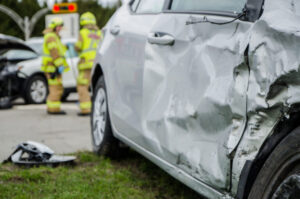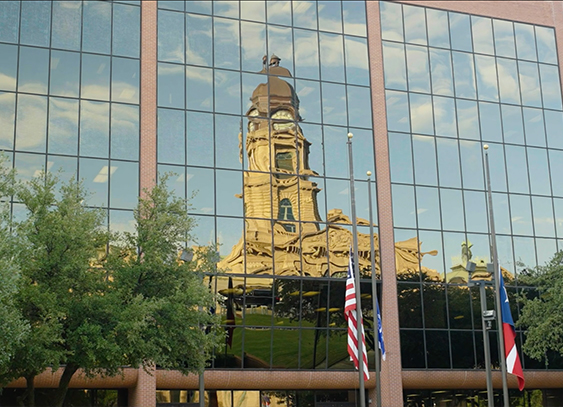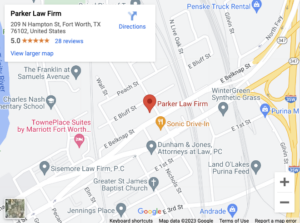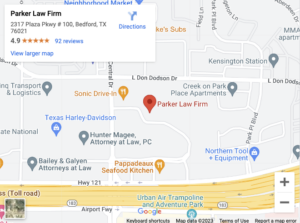
Emotions and adrenaline can run high after a car accident. This may make it difficult to think clearly, causing you to say things you may not intend. These statements can be used against you in a personal injury claim or lawsuit to reduce the compensation you may be entitled to, especially when they relate to fault.
It is a mistake to admit fault directly after a car accident in Fort Worth. If you or a loved one have been in a collision, resist the urge to apologize or accept responsibility. These admissions can have significant legal implications in Texas.
An experienced Fort Worth car wreck lawyer will help you understand how concepts like fault and comparative negligence may impact your personal injury case.
Understanding Fault For a Car Accident in Fort Worth, Texas

Fault is a legal term. In car accident cases, it refers to someone being legally responsible for the damages and injuries caused by the incident.
Fault is often based on the principle of negligence. A driver is considered negligent or at fault when they fail to exercise reasonable care on the road, causing an accident.
There are many examples of negligence on Fort Worth roads, including:
- Driving drunk
- Driving distracted
- Running a red light or stop sign
- Speeding
- Failing to yield the right of way
For example, you have a green light and start driving through an intersection. Another driver runs a red light and collides with you. The other driver would likely be considered at fault for the accident since they failed to exercise reasonable care by running the red light.
This example may seem obvious, but it is important to understand that determining fault can be more complicated. Many factors can complicate determining fault, particularly when multiple vehicles are involved.
Fault and Comparative Negligence in Texas
Admitting fault after a car accident may reduce your compensation. This is because Texas follows a modified comparative negligence rule.
When a claimant shares responsibility for an accident, their compensation is reduced proportionally by their percentage of fault. Additionally, if you are determined to be more than 50 percent at fault, you will be barred from recovering compensation entirely for injuries or other damages.
For example, if you are found to be 20 percent to blame for an auto accident and the total damages amount to $10,000, you would be eligible to receive $8,000. However, if you were instead found to be 51 percent at fault for the accident, you would likely recover nothing.
This system shows the importance of not admitting fault immediately after a Texas crash. Other factors may have contributed to the accident, even if you believe you were partly responsible. You may not be aware of these immediately after the accident without some investigation.
For example, another driver may have been speeding or driving while distracted. If you prematurely admit fault, it will be used against you to reduce or bar your potential compensation under comparative negligence rules.
Why Fault May Be Difficult to Determine After a Fort Worth Car Accident
Determining liability in a car accident can be complex because many different variables may be at play.
Factors that impact who is at fault for a Fort Worth car accident include:
- Weather conditions
- Road signs
- Traffic conditions
- Witness statements
- Surveillance photos or videos
- Physical evidence
A Fort Worth car accident attorney will gather evidence in your case to determine who is responsible. You may not have all the facts about the accident at the scene, which can make admitting fault problematic if you turn out to be incorrect. Let a lawyer investigate your case and evaluate where liability and fault may lie. You deserve to have an experienced team on your side.
How Admissions of Fault May Be Used Against You in Texas
Any statements you make after a Fort Worth car accident can be used against you as evidence. Statements may be used in lawsuits or insurance claims to significantly weaken your case, even if they were intended as a simple apology.
Insurance companies, in particular, use admissions of fault to minimize payouts. Depending on the facts of your case, such an admission may even be used to deny coverage or liability for damages and injuries you incur.
You provide insurers and other drivers with a way to reduce their liability for a car accident if you improperly admit fault. A Fort Worth personal injury lawyer will protect your rights and help you avoid making admissions that may be used against you in Texas.
The Role of a Personal Injury Attorney in Fort Worth, TX
Consulting a Fort Worth personal injury attorney can be a wise decision after a car accident. This is because of the challenges associated with establishing fault and the potential consequences of doing so incorrectly.
An experienced car accident lawyer can help you navigate the legal process, gather and analyze evidence, and communicate with insurance companies or other drivers. They can also guide you on handling questions from insurance adjusters and represent you in negotiations for a settlement.
If your case goes to trial, a lawyer will also help you refute allegations that you bear fault for the accident, which may threaten to limit or bar potential compensation.
Consult a Fort Worth Personal Injury Lawyer If You Believe You Are At Fault for a Car Accident
We understand it may be tempting to admit responsibility after a car accident in Fort Worth. However, resist the urge, even if you believe you are at fault.
Admitting fault can have significant legal and financial repercussions, especially when the facts of your accident show otherwise. Consult a Fort Worth car accident lawyer from Parker Law Firm Injury Lawyers as soon as possible at (817) 839-3143 for the representation you deserve.


